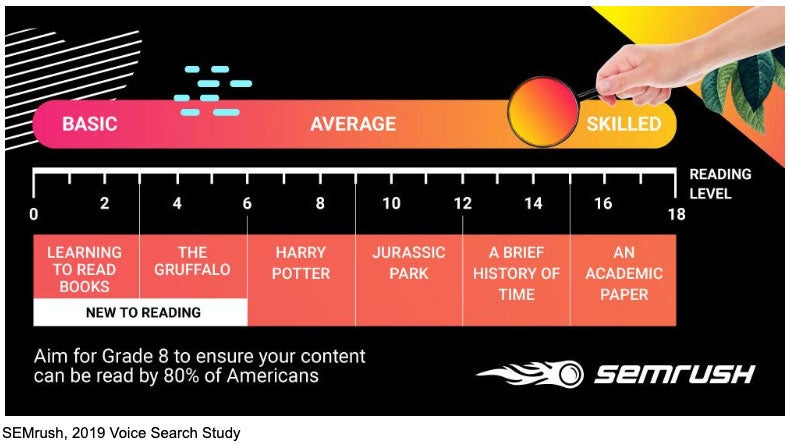5 Tips to Help Marketers Win in What’s Shaping up to Be the Future: Voice Search
Over half of consumers, one study revealed, have used voice search to find local business information within the last year. Doesn’t that tell you where “search” is headed?

Opinions expressed by Entrepreneur contributors are their own.
Every day, millions of Americans rely on voice-activated devices to tell them the weather, wake them up in the morning and answer a plethora of random questions they’re curious about. While the average voice assistant user may not worry about where those answers come from, digital marketers are working hard to ensure that voice devices rely on information from their sites to inform the answers people receive.
Related: 3 Ways Entrepreneurs Can Position Their Brand to Dominate Voice Search
And for good reason. Over half of consumers, according to a data roundup by Bradley Shaw, have used voice search to find local business information within the last year, and a quarter (27 percent) actually went on to visit the company’s website after conducting a voice search.
Voice is an increasingly common avenue for engagement between brands and consumers, and marketers must fight hard to rank high as a source of information within the voice realm. Here is what they need to know:
Five key ranking factors
Because voice-activated technologies are relatively new, marketing strategies designed to make use of voice devices are often undefined.
However, certain ranking factors (i.e., the factors that determine how high a web page ranks on Google’s search engine results page) do guide voice searches the most.
According to research by my own company, SEMRush, nearly 80 percent of the answers voice assistants provided for our searches ranked among the top three organic results, and 97 percent of the answers provided by Google Assistant ranked among the top 10 organic results.
Therefore, marketers seem to be prioritizing a first-page ranking before even considering a ranking for voice search queries.
Here are additional factors marketers should consider, which affect the ranking factors behind voice searches:
Featured snippets: The pictures and blurbs that help illustrate answers to search queries are essential when companies rank for voice searches. In fact, nearly 70 percent of all voice answers come from featured snippets, according to our study. To rank high for voice search queries, marketers should optimize pages to take advantage of this increasing phenomenon.
Related: Why Do Businesses Need to Optimize For Voice Search

Average word count: The average length of a voice search answer is 41.4 words. For example, Google Home has an average word count of 41.4, and, with the Mini version, 42 words. So, keep the answers on your search-page results at around 40 words or you’ll risk being outranked by competitors that do.
Readability: Search engines look for well-structured, well-written content that ultimately matches the intent of the query. This means that the readability of a page’s content is a key factor for ranking high on the results page. In general, the results from voice searches are understandable to the average 15-year-old, according to the Flesch Kincaid reading level test.
Page speed: The faster that results load, the better. For the majority of questions asked via voice, Google chooses an answer that loads faster than the average page on the search engine results page. In some cases, answers for Google Home voice searches have a page speed 10 times faster than the rest of the options found on the first page, making page speed one of the biggest factors in ranking for voice search.
Backlinks: Backlink anchors matching users’ search queries are found in 50 percent of answers for Google Home and Mini. Likewise, keywords in the title of the result are found in over a third of voice answers, a fact that offers increased opportunities for marketers to put their page results in front of target audiences. However, backlinks play a less significant role in voice searches conducted via smartphone devices, so marketers interested in mobile should be sure to blend backlinks with the other strategies listed above.
Search engine optimization (SEO) tactics are always evolving, and marketers must proactively learn new skills to stay ahead of their competitors and earn valuable web traffic from voice searches.
While the world has not completely transitioned to voice search, there’s no denying that consumers are quickly moving in that direction. In fact, by 2020, eConsultantcy has predicted, 50 percent of all searches will be conducted using voice.
Related: How Entrepreneurs Can Take Advantage of Voice Search Marketing
To stay ahead of search trends, start by using SEO tools to determine how a website ranks. Then, layer on upgrades in key areas like page speed, ranking in the top three results and occupying a featured snippet position. SEO strategies can take several months to yield results, so it’s important to get started now and prepare for a future where voice searches will be the norm.
Every day, millions of Americans rely on voice-activated devices to tell them the weather, wake them up in the morning and answer a plethora of random questions they’re curious about. While the average voice assistant user may not worry about where those answers come from, digital marketers are working hard to ensure that voice devices rely on information from their sites to inform the answers people receive.
Related: 3 Ways Entrepreneurs Can Position Their Brand to Dominate Voice Search
And for good reason. Over half of consumers, according to a data roundup by Bradley Shaw, have used voice search to find local business information within the last year, and a quarter (27 percent) actually went on to visit the company’s website after conducting a voice search.







